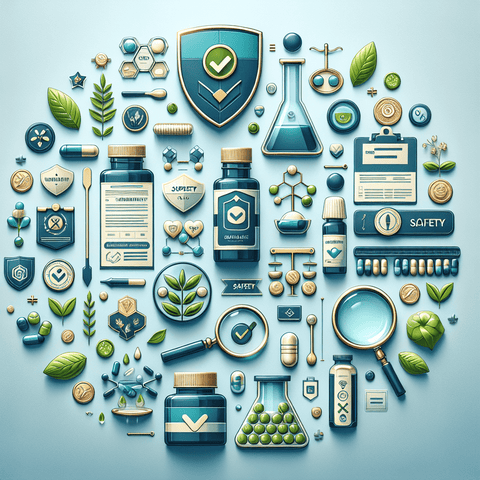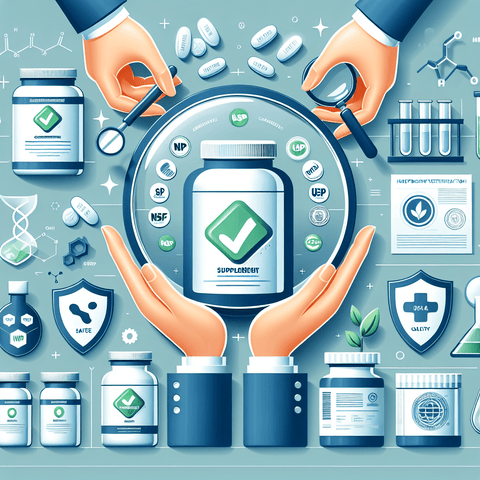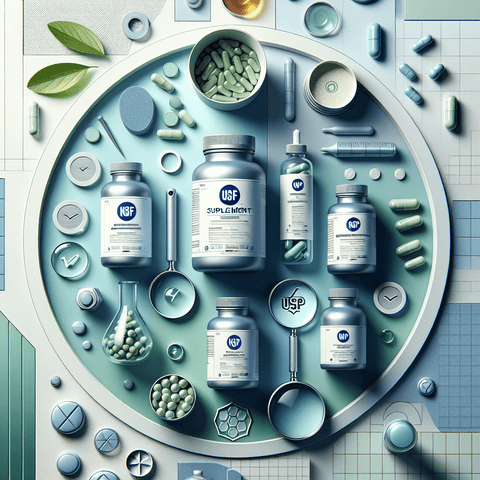Understanding the Importance of Supplement Safety in Nutritional Supplements
In recent years, dietary supplements have become an integral part of many individuals’ health and wellness routines. From boosting immunity to enhancing athletic performance, supplements offer a convenient way to fill nutritional gaps. However, despite their popularity, the safety of these products remains a significant concern for consumers, healthcare providers, and regulatory authorities alike. Ensuring supplement safety isn't just about avoiding adverse reactions—it's about protecting one's long-term health and well-being.
Supplement safety is critical because, unlike pharmaceuticals, dietary supplements often lack rigorous oversight and standardized manufacturing processes. Consumers may unknowingly purchase products contaminated with harmful substances or containing unlisted ingredients, leading to potential health risks. Common concerns include the presence of heavy metals such as lead, mercury, arsenic, and cadmium; adulterants like undeclared pharmaceuticals; microbial contamination; and inaccurate labeling of potency or ingredients. These issues underscore the importance of being vigilant when selecting supplements.
Misconceptions about supplement safety abound. Some believe that because a product is labeled “natural” or “herbal,” it is inherently safe. Others assume that all supplements sold online or in stores are regulated rigorously and meet safety standards. These assumptions can be dangerous. Without proper quality control, even seemingly benign products can harbor contaminants or dosage inaccuracies. The risks associated with low-quality or poorly regulated supplements include adverse health reactions, drug interactions, toxicity, and compromised efficacy of the intended health benefits. Moreover, contaminated supplements may cause long-term health issues, especially for vulnerable populations such as pregnant women, children, and the elderly.
Nutritional Supplement Regulations: What You Need to Know to Stay Protected
Regulatory frameworks governing dietary supplements vary significantly across the globe, impacting both industry practices and consumer safety. In the United States, the Dietary Supplement Health and Education Act (DSHEA) of 1994 classifies supplements as food, which means they are not subjected to the same pre-market approval process as pharmaceuticals. This shift places the responsibility largely on manufacturers to ensure safety and label accuracy, with the FDA overseeing post-market monitoring and enforcement.
In the European Union, regulations are often more stringent, involving comprehensive assessments of ingredients and manufacturing processes. The European Food Safety Authority (EFSA) establishes guidelines for supplement safety, including permissible ingredient levels and health claim substantiation. Similarly, countries like Canada and Australia have their own regulatory agencies requiring ingredient assessments, good manufacturing practices (GMP), and product registration to ensure consumer safety.
Understanding these regulatory standards is vital for consumers. Reputable supplements are typically produced by companies that adhere to Good Manufacturing Practices (GMP), which regulate facility control, cleanliness, staff training, and recordkeeping. When purchasing supplements, look for certifications and labels indicating compliance with these standards. Furthermore, third-party testing organizations often verify that the product meets label claims and safety standards. Recognizing such certifications signals a commitment to quality and safety, helping consumers make more informed choices.
Quality Assurance in Dietary Supplements: Ensuring You Receive Effective and Safe Products
Quality assurance (QA) is the backbone of safe and effective dietary supplements. It encompasses all processes involved in ensuring that a product consistently meets quality standards, from sourcing raw ingredients to final packaging. Key indicators of robust QA practices include compliance with Good Manufacturing Practices (GMP), third-party testing, certification, and transparency in sourcing and manufacturing processes.
GMP certification demonstrates that a manufacturer adheres to systematic procedures designed to minimize risks involved in pharmaceutical production, such as contamination, mislabeling, and inconsistencies. These standards are enforced by regulatory agencies like the FDA in the U.S. and the European authorities elsewhere. Companies committed to GMP certification undergo regular audits and adhere to strict protocols, which significantly reduce the risk of contaminated or mislabeled products reaching consumers.
Third-party testing is another critical aspect of quality assurance. Independent laboratories evaluate supplements for purity, potency, and contaminants such as heavy metals and microbial pathogens. This testing verifies that the product contains the ingredients and dosages listed on the label and is free from harmful substances. Consumers should seek out brands and products that openly display third-party test results or provide certificates of analysis (COA), indicating transparent quality control measures.
Transparency in labeling and sourcing further enhances confidence. Reputable brands openly disclose sourcing practices, ingredient origins, and testing results. This transparency demonstrates a virtual handshake of trustworthiness, allowing consumers to make informed decisions. For instance, if a supplement claims to contain specific amounts of beneficial compounds, verification through lab testing confirms product integrity. Choosing brands dedicated to these high-quality standards ensures you receive supplements that are both safe and effective.
Supplement Toxicity Prevention: Protecting Your Health While Optimizing Benefits
One of the most pressing concerns in supplement safety relates to potential toxicity. Low-quality supplements are often laced with harmful toxins such as heavy metals—lead, mercury, arsenic, and cadmium—that pose significant health risks. Additionally, contaminants like bacteria, molds, or pesticide residues can compromise product safety. Adulterants—substances added illicitly to mimic or enhance effects—are another danger, especially with products marketed for bodybuilding or weight loss.
Preemptive strategies to prevent toxicity hinge on source verification and batch testing. Consumers should prioritize products coming from reputable brands that rigorously test their raw materials and final products for contaminants. Sourcing ingredients from certified organic, non-GMO, and sustainably harvested suppliers reduces the likelihood of contamination. Brands committed to these practices often provide documentation or certificates that substantiate their sourcing and testing protocols.
Accurate dosing and ingredient transparency are vital to avoid toxicity. Excessive consumption of certain nutrients can be harmful—vitamin A or iron, for example, can cause adverse effects if taken in high doses. Always read labels carefully to determine the recommended dosage and avoid exceeding it unless directed by a healthcare professional. Equally important is checking the ingredient list for undisclosed additives, fillers, or synthetic substances that could pose health risks.
Educating oneself on reading labels is crucial. Look for clear, detailed information including ingredient sources, dosages, expiration dates, and batch numbers. Avoid products that lack transparency or have ambiguous labeling, as these are often red flags. Combining diligent label reading with choosing trusted brands significantly reduces the risk of consuming harmful supplements.
Reputable Supplement Brands: How to Identify Trusted Names in the Industry
Selecting a reputable brand is fundamental to ensuring supplement safety and efficacy. Trustworthy companies usually demonstrate transparency, accountability, and a commitment to quality. Key indicators include robust quality assurance policies, third-party testing, positive consumer reviews, and clear labeling. Improperly manufactured or fraudulent brands can jeopardize health, so consumers must learn to identify reliable sources.
Positive brand reputation is often built on transparency and consistent quality. Companies that openly share their sourcing, testing, and manufacturing processes tend to be more trustworthy. Consumer reviews and testimonials can provide valuable insight into product efficacy and company reliability, though they should be considered alongside factual certifications.
Recognized high-quality supplement brands often hold certifications such as GMP, NSF International, or USDA Organic, indicating adherence to high manufacturing standards. These brands often employ rigorous testing protocols and maintain transparency about their testing results, making it easier for consumers to assess quality.
Researching and verifying a brand's credibility involves examining its history, compliance with regulations, and reviews from independent testing organizations. For example, choosing well-established brands with a longstanding reputation for quality minimizes risks. Additionally, consulting healthcare professionals or nutritionists for recommendations can guide selection of trusted brands and products.
Safe Ingredient Sourcing: The Foundation of High-Quality Dietary Supplements
The safety and efficacy of dietary supplements hinge largely on the sourcing of ingredients. High-quality sourcing practices not only guarantee the purity of raw materials but also influence the supplement’s overall safety profile. Reputable manufacturers prioritize ingredients that are organic, non-GMO, sustainably harvested, and free from pesticides or contaminants.
Ingredient origin determines the level of potential contaminants – for instance, wild-harvested herbs might carry a higher risk of heavy metal contamination, whereas certified organic ingredients undergo rigorous testing to prevent such issues. Consistent sourcing from trusted suppliers ensures ingredient integrity, potency, and safety.
Responsible sourcing also involves collaboration with suppliers committed to sustainable practices, which reduces environmental impact and ensures long-term availability of high-quality raw materials. Asking manufacturers or reviewing their sourcing policies can clarify whether they prioritize quality and sustainability.
Consumers should research or query supplement manufacturers about their sourcing practices—such as whether ingredients are tested for contaminants before use, whether they are organically certified, and if suppliers follow sustainable harvesting procedures. These factors are foundational to producing products that are both safe and effective, helping consumers make empowered choices aligned with their health goals.
Conclusion: Making Informed Choices for Optimal Health
Safeguarding your health through dietary supplements requires a combination of knowledge, vigilance, and discernment. Recognizing the importance of supplement safety entails understanding the regulatory landscape, evaluating quality assurance practices, and trusting reputable brands that source ingredients responsibly. Educating yourself on how to read labels, verify certifications, and assess product origins ensures that you receive effective and safe supplements.
Remember that the foundation of a high-quality supplement lies in rigorous manufacturing standards, transparent sourcing, independent testing, and accountability. Before adding new supplements to your regimen, consult with healthcare professionals to ensure their compatibility with your health needs. Being vigilant and informed will empower you to make choices that truly benefit your health and longevity.
Q&A Section
Q: How can I tell if a supplement brand is trustworthy?
A: Look for certifications such as GMP or third-party testing, transparent labeling, clear sourcing information, positive customer reviews, and a longstanding reputation for quality. Brands that share their testing results and sourcing details openly are generally more trustworthy.
Q: What are the main risks of choosing low-quality supplements?
A: Low-quality supplements may contain contaminants like heavy metals, bacteria, or adulterants; have inaccurate label claims; pose toxicity risks; and fail to deliver the intended health benefits, potentially harming your health.
Q: How should I read supplement labels effectively?
A: Check the ingredient list for transparency and source information, note the dosages provided, verify expiration dates, and look for certification logos. Avoid products with ambiguous or incomplete labeling.
Q: Why is ingredient sourcing so important in supplement safety?
A: Sourcing determines the purity and contaminant levels in raw materials. High-quality, sustainably sourced ingredients reduce the risk of heavy metal contamination and ensure product efficacy.
Q: Should I consult a healthcare professional before taking supplements?
A: Yes. Especially if you are pregnant, nursing, taking medication, or have underlying health conditions, professional guidance ensures safe and appropriate supplement use.
Important Keywords
- Supplement safety
- High-quality dietary supplements
- Good Manufacturing Practices (GMP)
- Third-party testing
- Supplement contamination
- Ingredient sourcing
- Regulatory standards
- Supplement labels
- Certified supplement brands
- Health and wellness supplements
- Heavy metals in supplements
- Supplement brand reputation
- Sustainable harvesting
- EFSA supplement guidelines
- Safe supplement ingredients
For those interested in enhancing their nutrient intake, especially vitamins and omega-3s, visit [Vitamin C benefits](https://www.topvitamine.com/collections/vitamin-c-benefits-immunity-antioxidant-energy), [Vitamin D](https://www.topvitamine.com/collections/vitamin-d-benefits-sources-safety), [Vitamin K](https://www.topvitamine.com/collections/vitamin-k-benefits-bone-blood-health), [Magnesium](https://www.topvitamine.com/collections/magnesium-benefits-energy-muscle-bone-support), and premium [DHA/EPA Omega-3 supplements](https://www.topvitamine.com/collections/dha-epa-omega-3-supplements).



